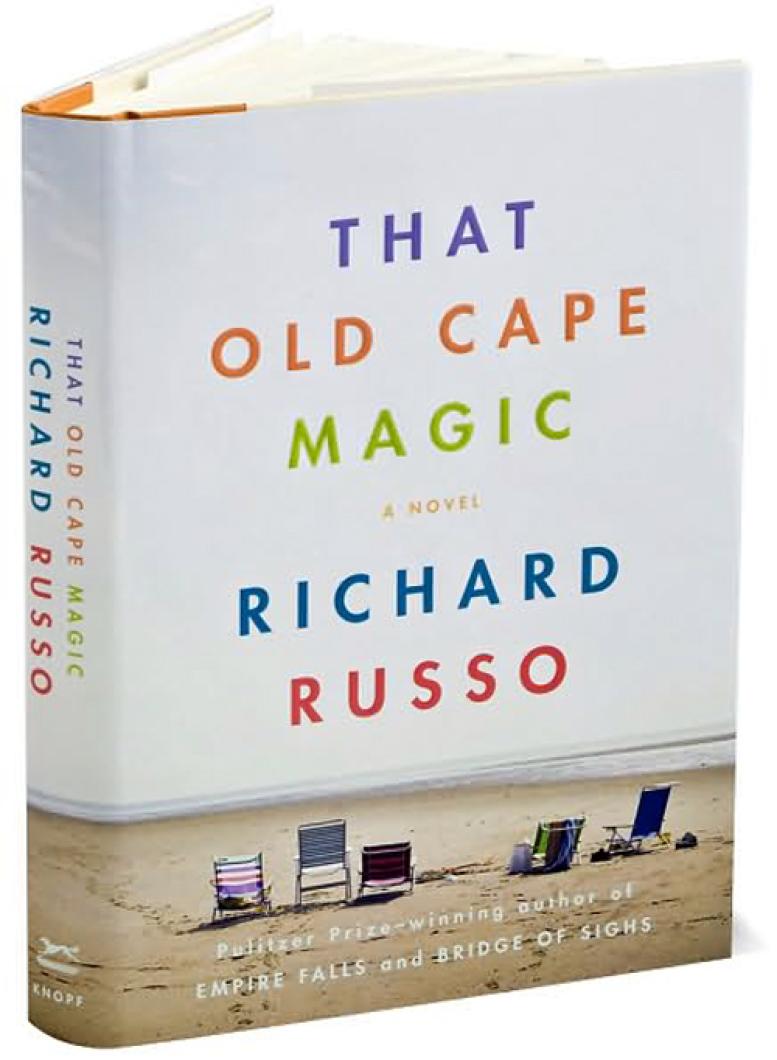THAT OLD CAPE MAGIC. By Richard Russo. Alfred A. Knopf, New York. 261 pages. $25.95.
O ne afternoon two friends happened to drop by my house. The first arrived in a little sports convertible. When the second showed up in his VW bus he walked inside and said, “It looks like a middle-aged meltdown out there.”
A kindred kind of humor and humility collide in Richard Russo’s new novel, That Old Cape Magic. Two weddings just a year apart bookend this portrait of Jack Griffin, a Los Angeles screenwriter turned New England professor, a likeable fellow in a middle-aged funk. His marriage is on eggshells and his job a crushing bore. His parents, well . . . where does one begin?
Cape Cod is more an emotional than physical landscape in this, Russo’s seventh novel. The first wedding is that of his daughter’s best friend and is held on the Cape, where Griffin spent lonely childhood vacations with his parents, two Ivy League educated English professors stuck teaching at an average Midwestern university. Their dream of owning a Cape summer home as an antidote to their unsatisfying careers remained unfulfilled, leaving them the right to be miserable.
On his way to the wedding Griffin climbs the Sagamore Bridge with his top down and his father’s ashes in the trunk. When he pulls onto the shoulder to take yet another call from his scathingly narcissistic mother, a seagull poops on his shoulder.
Can happiness be planned, unhappiness avoided? Griffin became a screenwriter to spite his snooty parents and later on his honeymoon agreed to the Great Truro Accord, a pact that turned out to be less a union of dreams than his wife Joy’s life plan. Now he is a balding tenured professor living in an old New England country home.
Before the wedding a strange message from his old Hollywood agent has Griffin yearning for a short working trip to Los Angeles. At the wedding his daughter Laura becomes engaged, leaving Joy blissful and Griffin wondering if his daughter’s love, “just now filling her heart to overflowing, could in the end leak away . . . .” Griffin and Joy are seated at table 17, the table farthest from the bride and groom, the “leftover” table, and the next day Joy admits she can no longer cope with her “congenitally unhappy” husband.
Griffin is relatable, human, funny. If you’ve ever considered taking antidepressants you’ll really like him. He is like a jellyfish, free-floating, his tentacles irritating his wife and her boisterous family, his best screenwriting buddy, and his one happy Cape Cod childhood memory. He sees the break-up with Joy as if it were a screenplay; in a pivotal scene she tries to explain: “You always retreat, Jack. It’s like you’re afraid it won’t last. Like if you admit to being happy, someone will steal it from you.”
A year later they each bring dates to their daughter’s wedding. His trunk now holds the ashes of both parents. On a park bench the day before the wedding his daughter asks: “Do you ever feel like you’re not who people think you are? Like you’re pretending to be this person that people like? And the worst part is they all believe you?”
“Only everyday,” he answers. “Unless I’m mistaken, that feeling’s what people mean by original sin. Only sociopaths are spared.”
The rehearsal dinner scene is too hilarious to explain.
This summer my siblings badgered me, made me promise, to read Russo’s books, which include the Pulitzer Prize-winning Empire Falls. Then the Gazette dropped That Old Cape Magic in my lap; it must be my lucky summer.







Comments
Comment policy »